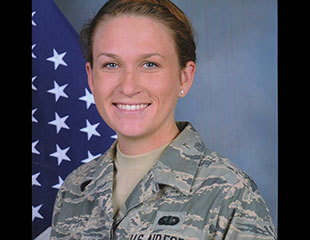Confronting the Aftermath of Military Sexual Trauma
5-minute read
Confronting the Aftermath of Military Sexual Trauma
5-minute read
Tawayna broke down crying when she saw the poster.
The U.S. Army Veteran was facing eviction and running out of options, so she went to her local VA facility for help. Walking the halls, she passed a poster that read “military sexual trauma.”
“I just started crying, and crying, and crying,” Tawayna remembers. “Because I was like, ‘Oh my God, that happened to me. They have a name for it.’ I was so shocked and so relieved — and mad, and sad. I immediately tried to reach out to the numbers that were on the flyer.”
The term “military sexual trauma” (MST) refers to sexual assault, sexual harassment, and other unwanted sexual acts that occur during military service. Anyone in the military can experience sexual trauma, regardless of their branch of service, age, ethnicity, sex, physical size, or sexual orientation.
MST can occur at any time or place during military service, whether a Service member is on or off duty or on or off base. The perpetrator(s) may or may not be someone known to the survivor and may be a fellow Service member or a civilian. MST experiences can affect a Veteran’s mental and physical health, sometimes even months or years after the experience.
The Effects of MST
MST affects survivors in many different ways. Some Veterans may experience lingering symptoms that can damage their relationships, career, and everyday life if left untreated.

Healing and acceptance after MST
Anna spent a lot of time alone after being sexually assaulted while serving in the Air Force. “I’d stay up all night because I couldn’t sleep,” she says. “I cried a lot — and was in my head a lot and blaming myself.” Mike, an Army Veteran, faced challenges with substance misuse, trying to bury his feelings after being sexually assaulted by a platoon sergeant. Nadine didn’t know where to turn after being sexually harassed while serving in the Coast Guard, so she suffered alone.
“I just did lots of self-destructive things,” explains Tawayna. After she was sexually assaulted during her time as a unit supply specialist in the Army, she says, “I would just drink to the point of passing out. All the time. All day, every day.”
Tawayna’s self-destructive behavior undermined her relationships, too: “I would always seem to find the people that just basically wanted to use me for what they could and then discard me when they were finished. And that was just a recurring thing.”
Other difficulties that MST survivors face may include:
- Feeling depressed or disconnected from others
- Having intense, sudden emotional responses to things
- Feeling angry, irritable, or jumpy all the time
- Feeling emotionally “flat” or numb
- Having trouble feeling love or happiness
- Experiencing issues with sleep, including nightmares or difficulties falling or staying asleep
- Having difficulty staying focused, concentrating, or remembering things
- Developing problems with alcohol or other drugs
- Experiencing physical health problems, including sexual issues, chronic pain, weight or eating challenges, digestive ailments, and more
“It’s So Worth It”
While MST can lead to intensely difficult symptoms, there are treatments and resources available to help Veterans significantly improve the quality of their lives.
“[My counselor] had me do a lot of different homework assignments,” says Anna, whose mother encouraged her to find help at the local VA facility's clinic for posttraumatic stress disorder (PTSD). One particularly helpful exercise was keeping a thought log, where Anna would document and examine specific thoughts she was having.
For example, if Anna found herself thinking “This was my fault,” or “I let him do this,” or “I spoke to him, so I must have let him believe that it was OK,” she would break those thoughts down. She would detail any evidence that really supported those feelings and, conversely, evidence that did not support them. “Being with the counselor, she’s definitely helped me work through certain trust issues or certain intimacy issues,” Anna says.
Writing about experiencing MST also helped Jodie, who was sexually assaulted during her service in the Marine Corps. And the writing helped shed light on her experiences with her husband, Todd. “It helped me to really understand … why, certain times of the year, she goes through the things that she does,” he says.
Jodie initially hesitated to write about her experience, Todd adds, but “once she did, the anger came out from it. It was a lot of anger pent up.”
After seeing the MST poster at VA, Tawayna says she eventually found inpatient treatment for substance misuse. “I started to come in touch with how I was affected with what had happened to me in the military.” The ongoing support from VA has been lifesaving, she says. “I feel really good about the things that I have learned. It’s a very painful process, but it’s so worth it in the end.”
MST Resources
If you have experienced MST, regardless of where you are in your recovery, please know that you are not alone, that healing is possible, and that MST is never your fault.
If you are an MST survivor or just want to learn more, call your local VA facility and ask to speak with the MST Coordinator. You may also talk with a VA health care provider or contact a local Vet Center.
- Learn more about MST and MST-related services at www.mentalhealth.va.gov/msthome.
- If you are in crisis and need immediate assistance, connect with the Veterans Crisis Line 24/7 by Dialing 988 and Pressing 1, texting to 838255, or chatting online at VeteransCrisisLine.net/Chat. You will reach a caring, qualified VA responder — many of whom are Veterans themselves.
